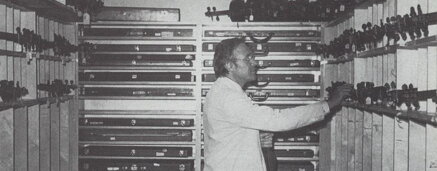© 2024 - In memory of Francesco Bissolotti in the 5th anniversary of his death
The Maestro Sacconi
in the testimony of the violinmaker, restorer and expert
Jacques Français
New York, March 29, 1984
The first time I met Fernando was in 1946 or 1947, when I came to New York. He had been a very good friend of my father. The first impression that one got of Sacconi was that he had such a wonderful look, so artistic with his big, white hair. He really looked the part. He was so wonderful – tall, or at least it was my impression that he was tall, with a great physique and a very gentle manner. He spoke to me in French, and he was very receptive and friendly. We didn't talk about work that first time we met. When I saw him most was when I started to open my own business. I had worked at Wurlitzer for two or three years, but not with Sacconi. When I wanted to go on my own, he was very nice about that, encouraging me to do it. After I opened my shop next door on 57th Street, he was so generous and helped me every time I came to him for an opinion or advice on how to do this or that.
He never kept any secrets from anybody. He is one of the few men I have met in the profession that really liked to teach and help people, to show and demonstrate to them what he knew. I do not think there has been a more important teacher and violinmaker since Vuillaume. He was the first one ever to have developed new techniques, especially in restoration. In fact, he started a new school of restoration in the United States, of which the Europeans are envious. It is because of Sacconi that the standards in the United States are so high in comparison to Europe.
In spite of all that, at the end of his life he had difficulties at Wurlitzer. There was friction and a lot of jealousy after Rembert died, and Sacconi was so unhappy that he really wanted to come and join René Morel and me. That didn't work out, in part because he was so emotional and sensitive and was afraid to express his feelings at Wurlitzer. We were always great friends, though. I remember when there was a party for him and we were so happy to see each other that we talked for a whole hour about literally everything!
He was such a warm, friendly person. And he loved to play little tricks on people to make them laugh. I remember once he told me about the fun he had with a musician who brought him what he thought was a Tourte bow that he had found in Europe. Sacconi realized immediately that it was not a Tourte, explained to the man that he had been cheated, and said that if he wanted to get rid of it, he'd buy it from him for what it was worth. Then Sacconi amused himself by recutting it exactly like a Tourte and calling the man to tell him he'd found him a real one. The man came in, tried it out, said it played beautifully, and wanted to buy it. Then Sacconi smiled gleefully and told the man he had only wanted to see if he could make a foolproof counterfeit. He was so good he would never have used his extraordinary talent to cheat anyone, but he adored trying to fool people and then telling them what they had in their hands was his own copy of some famous original. It was certainly never meant to hurt the person, but was just for pleasure and fun, like a sport for him. There was never any money or personal profit involved in these jokes.
He also loved fishing and hunting. He told me once about rabbit hunting. You have to walk very slowly in the high grass, and you keep stopping to listen for the rabbit. You don't walk fast, because you find the rabbit with your ears, not your feet. You see, it's useful to have trained your ear with violins!
He loved his studies of the violin, especially those of Stradivarius, as much as his sports. He was the greatest expert on Stradivarius, and studied him more than any other violinmaker ever has. He knew so much about him that I know he was not able to put all he had learned in his book, «The 'Secrets' of Stradivarius». It's a shame, because he was such a treasury of knowledge. Nevertheless, the book is very, very interesting and so important as a great step forward in the understanding of the work of Stradivari.
Apart from his book, his life's work is still living in the teaching his pupils are doing. The work of his whole lifetime is in that book and in his pupil's work. He also left behind some wonderful fiddles, and he made some incredible scrolls and other parts that were missing on different Stradivariuses. You have to be a very good expert to catch these repairs. It's a challenge!
Sacconi dedicated his whole life to the violin: to the fiddles he made, to his extraordinary restorations, and to his book. How much more could he have done?!
New York, March 29, 1984
Taken from the book: «From Violinmaking to Music: The Life and Works of Simone Fernando Sacconi», presented on December 17, 1985 at the Library of Congress in Washington, D.C. (Cremona, ACLAP, first edition 1985, second edition 1986, pages 69-70 - Italian / English).

Jacques Français
Français in the storeroom of his shop.
© 2024 - In memory of Francesco Bissolotti in the 5th anniversary of his death